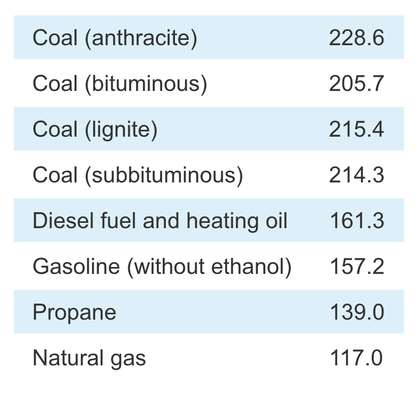|
How much carbon dioxide is produced when different fuels are burned? Different fuels emit different amounts of carbon dioxide (CO2) in relation to the energy they produce when burned. To analyze emissions across fuels, compare the amount of CO2 emitted per unit of energy output or heat content. Pounds of CO2 emitted per million British thermal units (Btu) of energy for various fuels: The amount of CO2 produced when a fuel is burned is a function of the carbon content of the fuel. The heat content, or the amount of energy produced when a fuel is burned, is mainly determined by the carbon (C) and hydrogen (H) content of the fuel. Heat is produced when C and H combine with oxygen (O) during combustion. Natural gas is primarily methane (CH4), which has a higher energy content relative to other fuels, and thus, it has a relatively lower CO2-to-energy content. Water and various elements, such as sulfur and noncombustible elements in some fuels, reduce their heating values and increase their CO2-to-heat contents. https://www.eia.gov/tools/faqs/faq.php?id=73&t=11 *
Comments are closed.
|
(RE)SOURCESHere you will find a collection of material, ranging from technical data to white papers to theory, which has influenced my thinking. Archives
December 2020
Categories
All
|

